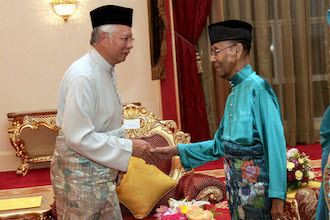Can the King help Mahathir remove Prime Minister Razak?

By Zofia Reych, ASEAN Today
After months of requests, Mohammad Mahathir finally got an audience with the Malaysian head of state, The Yang di-Pertuan Agong. On September 15, the King received Mahathir in his residency, Isana Anak Bukit in Alor Setar, but it seems that the outcome of the long awaited meeting wasn’t what the embattled opposition leader had hoped for.
The Citizens’ Declaration
In March this year, amidst a slowing economy and the raging 1MDB scandal, 58 Malaysian opposition leaders came together to sign a petition demanding PM Najib Razak’s resignation. They were united by “one goal” under the leadership of Razak’s most prominent enemy, Mohammad Mahathir.
“We call upon all Malaysians, irrespective of race, religion, political situation, creed or parties, young and old, to join us in saving Malaysia from the government headed by Najib Razak,” read the joint statement released by the alliance.
The original signatories sought both public support and a royal intervention that could help remove Najib from his office. Within just over two months, Mahathir claimed that the Declaration had gathered a further million signatures from members of the public (1,071,997 verified online signatures, and 200,000 physical signatures). In September, the opposition announced the plan to present the document officially to the Malay rulers.
Seeking the royalty’s support could be a smart move, especially at a time when their relationship with Najib Razak continues to sour. However, even if the King, Yang di-Pertuan Agong Tuanku Abdul Halim Muadzam Shah, wished for the removal of Razak, he lacks the constitutional power to make it happen.
“There must be evidence in the form of loss of confidence by Dewan Rakyat members,” explains constitutional lawyer, Syahredzan Johan. Dismissing the PM could theoretically be possible if the MPs took a vote during a Dewan Rakyat session.
At present, the ruling Barisan Nasional coalition headed by Najib holds 133 of 222 parliamentary seats.
Desperation, or smart PR?
An experienced politician of Mahathir’s calibre wouldn’t make the mistake of hoping that the Agong would sack Najib. Although the Malaysian PM is traditionally appointed by the monarch, it is largely a formality.
Yet the King, as well as 13 royal heads of the Malay states, are held in great respect by the public. The rural Malay majority sees them as warrants of traditional customs and Islamic values. Mahathir is more than aware that losing the royal mandate would be a serious blow to Najib.
The traditional rulers mostly refrain from interference in politics, but in October last year the 1MDB scandal prompted them to issue an unusual statement, calling for transparency in investigating the huge sums flowing in and out of Najib’s bank account.
Although no royal statement followed the Agong’s meeting with Mahathir, for some, the mere fact that the monarch discussed The Citizens’ Declaration is telling. Yet the opposition possibly missed out on the opportunity to gain a footing as no statement was released by Mahathir’s camp after the audience.
Meanwhile, PM Najib issued a statement claiming that he and the Agong separately discussed the royal’s meeting with Mahathir. “At that meeting, his majesty took note of issues raised by Tun Dr. Mahathir. However, his Majesty the King also explained to Dr. Mahathir that his majesty cannot get involved in efforts by PPBM,” said Najib.
Headed by Mohammad Mahathir, the PPBM is a new party on Malaysia’s political scene. Although it was registered by Muhyiddin Yassin months after the inception of The Citizen’s Declaration, overthrowing Razak is high on its list of priorities. Unfortunately, apart from its popular leader, the PPBM seems to lack dynamism, and be far from ready to pose a serious opposition to Razak.
Muhyiddin introduced the party as “inclusive in nature, progressive and open minded” with “a reform agenda that is comprehensive” and ready “to take care of each citizen’s welfare regardless of race or religion.” Although the party is more open to non-Malays than UMNO, it is still likely to remain largely conservative.
With decades of involvement in the highest ranks of UMNO, both Mahathir and Muhyiddin seem to bring nothing new to the table. As an unnamed “veteran political observer” told Free Malaysia Today, their new party seems much like a UMNO photocopy.
Najib’s position remains unthreatened as he holds the two most important posts in the country. From cronyism to fraud, the public, as well as the royals, can clearly see his flaws. Yet to actually oppose him, they need to be given a real choice. As the opposition lacks a programme beyond getting rid of the Prime Minister, the Malaysian political scene is unlikely to see any dramatic change.

